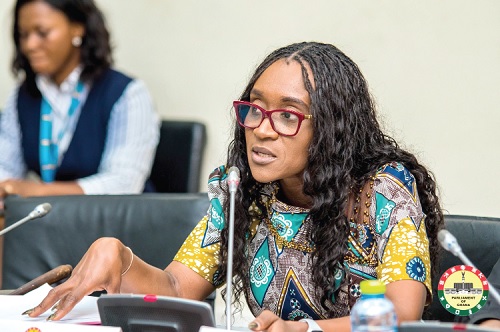
Translating Affirmative Action Law into leadership pipelines for girls, young women
Leadership pipelines for women and girls in Ghana remain painfully narrow, despite decades of advocacy, urging the country to prioritise women’s leadership.
Society continues to hold rigid expectations that a woman should be submissive, careful and constantly seeking permission to occupy space.
These perceptions persist even in an era where Ghana has finally passed the Affirmative Action (AA) Law, a landmark tool meant to dismantle the very barriers that keep women from leading.
Over the past two weeks, I have watched with admiration the remarkable work of Abena Osei-Asare, Chairperson of the Public Accounts Committee (PAC). Her professionalism, firmness and composure have been a masterclass in leadership.
This is the type of excellence we envisioned when advocating for gender-balanced representation in our governance structures.
I commend the government for its efforts toward operationalising the AA Law and aligning institutional mechanisms to support women in leadership.
Yet this admiration was quickly overshadowed by calls—some irrational, others laced with prejudice—for her removal.
What was even more disturbing was that among those calling for this unjust petition were lawmakers who should be champions of the very law they enacted.
It forced me to pause and ask: What happened to the promise of Affirmative Action?
How do we uphold the law in public, yet undermine its purpose in practice?
Some critics remain blinded by entrenched gender norms, unable to reconcile their own biases with the composed, assertive and effective leadership demonstrated by a woman at the helm of a major parliamentary committee.
Their discomfort reveals a deeper truth: while the law exists, attitudes are yet to evolve.
I was happy when I noticed how she quickly amended some attitudes which the public capitalised on to call for her removal from the committee.
What the AA Law really requires
Implementing Affirmative Action in Ghana is not simply about filling quotas or adding women to leadership tables for symbolic value.
It is about integrating equality into the everyday fabric of our national operations.
It compels public institutions, political parties, and workplaces to dismantle systemic barriers that prevent women, youth and marginalised groups from thriving.
This means that every board appointment, recruitment exercise, policy review and development initiative must be consciously evaluated through a gender lens.
Gender balance should not be an afterthought. It should be a baseline expectation.
Institutions must track their progress, practice gender-responsive budgeting and commit to non-discriminatory policies across all sectors.
But beyond institutional adjustments, society must transform too.
As of 2024, only 14.5 per cent of Ghana’s parliamentary seats were held by women, according to the Inter-Parliamentary Union.
At the same time, women dominate the informal sector, often under precarious, low-income conditions, without social protection.
This is not only a social imbalance but an economic limitation.
A nation cannot fully develop when half its population is structurally disadvantaged.
From promise to prejudice
For many Ghanaian girls, cultural expectations limit their aspirations long before they fully understand their potential.
They are raised to support others rather than to lead, dream or challenge the status quo.
The discrimination women and girls face does not magically disappear when they step into womanhood; it evolves into more complex and deeply rooted inequalities.
A simple scroll through Ghanaian social media reveals the daily hostility women endure—body shaming, sexualised insults and dismissive commentary questioning their competence, capabilities or right to occupy public space.
Even in the era of Affirmative Action, some Ghanaians still doubt the successes of women, often attributing their achievements to everything except merit.
A woman’s success is inspected with suspicion, while a man’s is celebrated without question.
A wealthy woman is interrogated, but a wealthy man is praised.
These double standards form the cultural backdrop through which girls grow, shaping what they believe is possible for themselves.
These challenges follow women into adulthood. A girl denied education becomes a woman confined to limited economic opportunities.
The Ghana Living Standards Survey (GLSS 8) highlights that women and girls spend three times more hours on unpaid care and domestic work than men.
This restricts their capacity to pursue education, careers and leadership pathways.
Adding to this gender pay gap are limited access to land, credit, and discriminatory inheritance practices, and it becomes clear why women-led households disproportionately experience poverty.
A call to action
Translating the Affirmative Action Law into leadership pipelines for girls and young women is not a ceremonial gesture. It is a national obligation.
It requires that our systems be intentionally designed to include women, not reluctantly accommodate them.
It demands that we create environments where women can lead, make mistakes, learn, grow, and be constructively criticised without being torn down.
We must extend grace to women leaders, just as we do to men.
We must normalise women occupying power without questioning their legitimacy.
And most importantly, we must conscientiously implement the AA Law not just in Parliament or boardrooms but in our institutions, communities, churches and homes.
If Ghana is truly committed to inclusive development, then building leadership pipelines for girls and young women is not optional; it is essential.
The future of this country depends on unlocking the full potential of every Ghanaian (not only men), and not a select few.
The writer is a Columnist, PR Specialist & Social Justice Advocate
